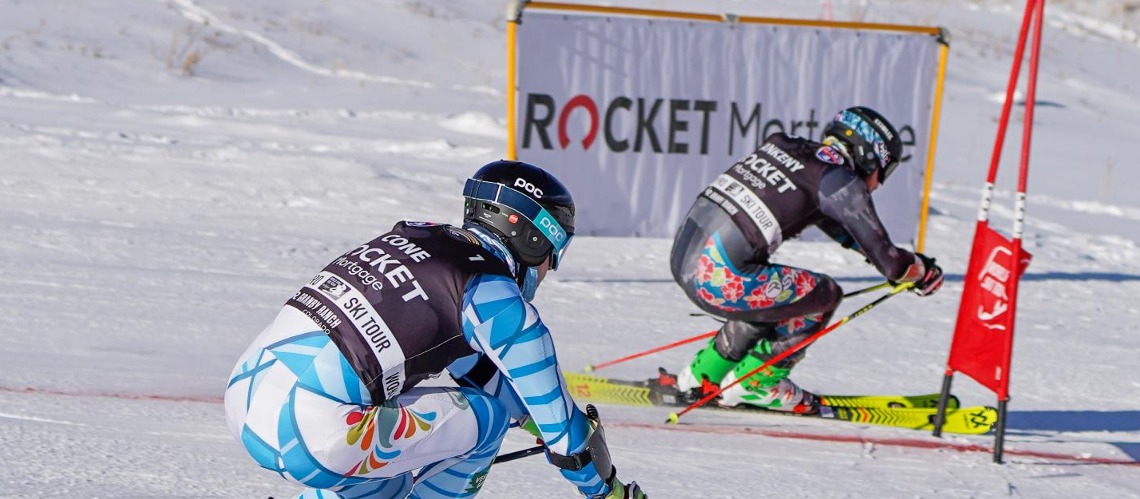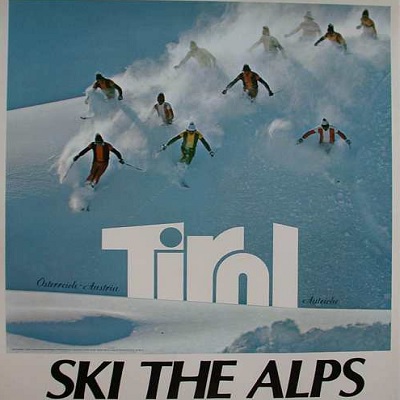2022 Taos World Pro Championships Wrap Up. Strasser & Moltzan Win SL, Read and Fleckenstein GS

The World Pro Ski Tour finished on a high in Taos at the weekend.
In Saturday's slalom as German Olympic medalist Linus Strasser stood in the start gate of his final run of the World Pro Championship Men’s Super Slalom at Taos Ski Valley on Saturday, the one second deficit he had against his opponent, World Pro Ski Tour regular Miha Kuerner, felt like 10 minutes. However, after Kuerner misjudged his launch and that one second ticked slowly by, Strasser was off to the races and nobody could catch him.
“The time difference in the signal, it was like, that’s a second? It feels way more,” said Strasser, after landing the victory Saturday. “The conditions were super difficult. You can do a mistake really fast.”
Strasser, who helped Germany to a silver medal in the Beijing Olympic Team Parallel race and also won the prestigious World Cup Slalom race in Schladming, Austria, this season, conquered one worthy opponent after another on Saturday. The onslaught began in the opening round of 32 against Austrian Tobias Kogler, who was fresh off a pair of FIS giant slalom victories in Aspen. University racer Filip Forejtek of the Czech Republic then almost took Strasser down in the round of 16 until missing a gate. The German then came up against WPST veteran Nolan Kasper in the quarterfinals, squeaking by him in the first run, then gunning ahead on the slower red course. It was the semifinals where Strasser really found his stride, taking down fellow World Cupper and top U.S. Team slalom racer Luke Winters in a pair of closely contested runs.
Before facing 35-year-old Kuerner of Slovenia in the finals, Strasser admitted that he was gassed and he preferred “just two runs” to the 10 required in one day of WPST racing.
“It’s getting from run to run more exhausting,” he added, to which Kuerner responded by saying he’s “not just a veteran, I know all the tricks.
The Slovenian also said he was honored to race against Strasser and that by the final run, he was “running on fumes.”
Indeed, it was mental weariness that cost the Slovenian the victory as he barged (ran up against the start gate) on his final run, in which he had a full second advantage on Strasser after the German missed a gate in his first final run.
“I thought I was going at the right time. To be completely honest, I was so tired, I couldn’t focus enough,” Kuerner said after the race, still admitting that the result ranks among his best ever.
“The World Cup guys have better material and they’ve always had a little something on me,” said Kuerner, who missed the previous WPST stop in Steamboat Springs and coaches full time for Ski Club Vail. “But I went above and beyond and got some decent skis I used when I was racing.”
When asked if racing on the World Cup gave Strasser a leg up, he said “it doesn’t have anything to do with it.”
“It’s exhausting for the head, but also the body,” he said. “I like it because it feels more natural. You have to risk it all onto the track.”
Certainly, risking it all was what every racer was doing on Saturday as the combination of all-out hammering and softening spring snow eliminated one top contender after another. Addison Dvoracek took out WPST Rookie leader Drew Duffy in the very first round while World Cup up-and-comer River Radamus made a big mistake in the first heat and lost to Tucker Marshall. Recently retired World Cup racer Alex Leever crashed in the round of 16 as Canadian Jeffery Read advanced and proceeded to also take out one of the WPST’s stars, Michael Ankeny, in the quarterfinals. Kuerner managed to take down WPST two-time tour champion Rob Cone in the quarterfinals and only charged ahead of Read after the Canadian crashed while holding the lead in the semis.
Read managed to round out the podium Saturday, beating Winters for third place in the small final.
For the women nothing came easily in the World Pro Ski Tour, presented by Rocket Mortgage – 2022 Taos World Championships Women’s Super Slalom on Saturday. While the first timers on the Rocket Mortgage Women’s Tour ended up as exhausted as anyone, they were the ones who prevailed.
U.S. Olympian Paula Moltzan, who helped her team to nearly medal at the parallel event in Beijing this February and whose only World Cup podium to date has come in a parallel race (Lech/Zuers in 2020), walked away with the big win and a check for $20,000.
“It was definitely a lot of runs to put together all at once. I’m so tired,” Moltzan said. “I’m tired, but happy to be here. I haven’t had this much fun all season.”
Moltzan started off strong, handily beating university tech specialist Ainsley Proffit, but then facing fellow Olympian and World Cup racer Erin Mielzynski of Canada in the quarter finals. The two went neck and neck in both of their runs, Moltzan nearly crashing at one point, recovering after doing the splits in the middle of the course, but still advancing to take on Colorado University’s Stefanie Fleckenstein in the semis. That matchup also proved tight, the 28-year-old U.S. Ski Team athlete getting caught in a rut, but pulling ahead by less than two tenths of a second even while finishing the heat on the much faster blue course.
“The snow likes to catch your skis once it’s soft. It’s hard to get out of it,” she said afterwards. I’m just trying to learn run to run.”
Moltzan faced Tricia Mangan in the finals, a fellow U.S. Olympian (two-time, including an 11th place in the Beijing Alpine Combined), who was the top qualifier coming into the Taos races.
Mangan encountered snafus of her own throughout the eight-run race day, beginning with coming back from a first-run deficit to beat Ava Jemison in the round of 16 and also Canadian World Cupper Amelia Smart in the quarterfinals, in which Mangan crashed across the finish line to advance.
“That was not ideal,” she said of the crash. “But everyone was so tired at that point, so it was OK.”
Mangan went on to face Rocket Mortgage Women’s Tour leader Tuva Norbye in the semifinals, the first run of which was so close it called for a computer review to determine who won. Mangan then pulled ahead by just over two tenths to advance and square off against Moltzan. A mistake in the final run put her in second place overall.
“This is very different than anything I’ve done,” Mangan said of the World Pro Ski Tour. “It’s the mental game, the tricky start, how many runs you have to do. It’s different, but it’s fun because every single run is anyone’s game.”
Even with her success in parallel events on the World Cup and in the 2022 Olympics, in which she, along with teammates Mikaela Shiffrin, River Radamus and Tommy Ford ended up fourth, Moltzan concurred that the WPST format is a beast of its own.
“They’re not comparable,” she said. “They’re not even in the same realm.”
Moltzan ended up walking away with a massive prize purse of $20,000 for the win, while Mangan collected $6,300 and Fleckenstein $4,500, the Canadian edging tour leader Norbye for third in the small final, Norbye collecting $3,000 for fourth place
In Sunday's GS the two most consistent skiers of the World Pro Ski Tour, presented by Rocket Mortgage, 2022 Taos World Championships were in the middle of facing off in a nail-biting final race in the women’s giant slalom Sunday at Taos Ski Valley when things got extra exciting and a little bit scary.
World Cup skier Paula Moltzan, fresh off of her first WPST appearance and big win in Saturday’s slalom was up against three-time All-American university racer Stefanie Fleckenstein of Canada, who took third Saturday in her WPST debut.
Both skiers aced every single one of their runs leading up to the final round on Sunday, which presented challenging conditions – flat light, gusty winds and a dangerously hard and fast snow surface in the morning that led event organizers to operate the opening rounds in a solo dual rather than head-to-head parallel format.
Nonetheless, Moltzan took down U.S. development team up-and-comer (junior worlds silver medalist and Nor-Am ace) Ava Jemison and Fleckenstein handily defeated Austria’s Denise Dingsleder, beating her by more than two seconds with the two-run combined time.
Fleckenstein’s dominance held through the quarterfinals, when head-to-head racing returned and she maxed out her lead against Italy’s Giulia Paventa as Moltzan squeaked by Poland’s Magdalena Luczak.
Margins became tighter in the semifinals, Fleckenstein barely edging University of Utah’s Kaja Norbye while Moltzan capitalized on her first run lead to beat World Cup veteran Erin Mielzynski.
Following numerous course holds due to crashes, high winds and salting the course, the two yet-to-be defeated athletes threw everything on the line as they charged in unison down the first run of the final round. On the decidedly faster blue course, Fleckenstein had pulled ahead as the racers approached the finish line. In her effort to maintain pace and straighten out her line, Moltzan lost control and crashed over the final jump. For a frightening few seconds, the Olympian lay motionless on the course. She eventually stood and shakily exited. Having sustained a hard blow to the head, she did not compete in the final run, leaving the victory and consequent victory lap to Fleckenstein.
“It sucks Paula couldn’t finish, because you obviously want to fight to the end, but I’m glad she’s OK and I’m very happy to win some money,” said Fleckenstein, who took a year off of her elite college racing career at Colorado University (where she held a 3.9 GPA) to try to compete in Beijing and plans to put the $24,500 she earned over this weekend toward her independent racing pursuits next season.
Although tired and sore from Saturday’s long day of racing, the 24-year-old Whistler native said anxiety didn’t come into play even as she saw that she’d face Moltzan (who beat her in Saturday’s semis) in the finals.
“Honestly, there were no real nerves,” Fleckenstein said. “I knew Paula was going to fight like she’s been fighting all weekend. I just knew that if I skied clean, we’d be close. That’s all I could really ask for. It worked out.”
Moltzan said she’d “had a really fun day” up until her crash, after which she still managed to smile and attend the award ceremony, collecting her second-place prize money ($6,300 as well as $25,000 as the overall champion of the Taos 2022 WPST World Championships, presented by New Mexico True.
Kaja Norbye ended up taking down Mielzynski in Sunday’s small final to take third place. Her older sister, Tuva Norbye, relinquished her undefeated tour status this weekend. She fought to fourth place in Saturday’s slalom, but wasn’t able to harness her typical WPST fire on Sunday, taken out by Katie Vesterstein in the solo-racing round of 16.
“I ski better with that person beside me,” Tuva Norbye said Sunday after her early elimination. “That’s the most fun thing about the Pro Tour is the head-to-head format and that instant feedback of how you’re doing. There’s so much money on the line this weekend, it would have been good to do my best. It’s not my day.”
Another big upset of the day was Kaja Norbye’s defeat of two-time Olympian and Saturday runner up Tricia Mangan in the opening round, when Mangan crashed through a panel and called it an early day.
For the men, there were several new faces dominating Sunday’s men’s World Pro Ski Tour giant slalom event, and most of them were Canadian. The surprises came one after another during the final race of the WPST 2022 Taos World Championships, presented by New Mexico True, which featured athletes from 10 nations.
As the morning met with gusty winds and flat light that rendered the Taos Ski Valley course dangerously hard and fast, racing began in uncharacteristic fashion, with athletes taking to the course solo rather than head-to-head in the opening round of 32.
The biggest shocks came early on as WPST favorites Rob Cone, Nolan Kasper and Saturday’s second place finisher Miha Kuerner were quickly eliminated.
“I was just trying to be as consistent as I typically am on the tour,” said Cone, who was undefeated for two full seasons and had never missed a podium throughout his entire WPST tenure before Saturday’s seventh-place finish. “I’m proud that some of the old guard of the Pro Tour held strong in the top 8 [Saturday]. Here, this is a standard, FIS-style, solo timed run. There’s not that instant feedback of head-to-head racing, where all you need to do is beat that fella behind you, ahead of you, beside you. I love having a racer next to me to know what I have to do.”
The head-to-head format returned for the ensuing rounds of Sunday’s GS, but the upsets continued. Canadian World Cup skier Trevor Philp came out swinging, defeating Olympic medalist Linus Strasser of Germany, who won his WPST debut race on Saturday. Philp beat Strasser in the round of 16 as Austrian NCAA champion Tobias Kogler eliminated WPST luminary Simon Breitfuss-Kammerlander. Also, World Pro Ski Tour rookie leader Drew Duffy came back from a first-run deficit to take down ringleader Michael Ankeny and Canadian speed specialist Jeffrey Read, after putting down the Rocket Mortgage Run of the Day, defeated U.S. Olympian River Radamus.
Duffy then edged Jeffrey Read in a hotly contested quarterfinal round as the older Read brother, Erik, found a gear that nobody else could for the remainder of the day. Erik Read took out compatriot Simon Fournier in the quarterfinal and then Duffy in the semifinal, Duffy sustaining a hard crash in the first run as Read surged ahead to face yet another teammate, Trevor Philp, in the final.
Erik Read, 30, claimed his top results of the season in parallel events, including a seventh in the Lech/Zuers World Cup parallel, ninth in the Beijing Olympic team event and eighth in team parallel at World Cup Finals. Otherwise, the majority of his top 10 Cup results have come in giant slalom. Most of Philp’s top World Cup results have also come in parallel, and the two gave each other a true run for their money in the final round, Read squeaking ahead by less than two tenths of a second for the win.
“Trevor and I were down to the wire,” Read said. “I saw him right next to me going off the jump coming into the alley to the finish, so I knew it was going to be close. The last time I raced him was on the Lech World Cup and he got the best of me, so this was redemption. I’m super happy with the win.”
Read’s uncle, World Pro Ski Tour legend Jim Read, coached Erik in the dual format when he was growing up. Still, the Canadian World Cupper didn’t mind starting the day on the more familiar solo course.
“That was more like traditional ski racing,” Read said of Sunday’s opening round. “I pushed out and it was like, OK, this is GS. I know what I’m doing. But I love the head-to-head format. I’m glad we stuck to it for the rest of the day.”
As for the Canadian dominance on Sunday, Read said the team came into the race knowing they were strong in parallel GS. That’s not to say the weekend didn’t require a steep learning curve.
“It’s totally different here,” Read said of the WPST. “I was figuring it out as quick as I could yesterday. The gate makes a big difference, but it’s also the mentality you have when you’re out [on the course]. If you’re neck and neck, then you know you can keep skiing at that level and stick to your game plan. But if they get ahead of you, that changes it. You start trying to push a little more, take a little extra risk to catch up and that’s when mistakes happen. It’s really about nailing the start, but if you don’t, keeping your cool and executing the rest of the way down.”
Read was impressed with his inaugural Pro Tour experience all around.
“Trevor and I were both knocked out in the round of 16 yesterday. It goes to show how good these guys are, the classic Pro Tour skiers,” Read said. “I also want to say thank you to Taos. It’s been a great atmosphere.”
In addition to his $20,000 for the race win, Read split an additional $25,000 with Strasser, tying the German for the Taos World Championship overall title.













